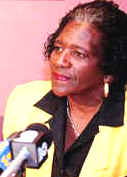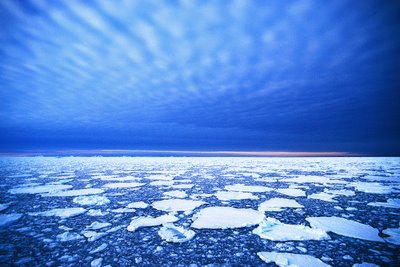
October 30, 2006
October 25, 2006
Remembering a Warrior



The Honorable Bea Gaddy
A mother, community activist, city councilwoman, and fighter for justice - Ms. Bea Gaddy was known city-wide for her efforts to stamp out hunger and poverty in East Baltimore. A tireless warrior for justice, she worked diligently to help families in need of care and resources. Without reservation, everyone could count on Ms. Bea to host the annual Thanksgiving Dinner for the homeless; it was a Baltimore tradition. It was amazing to see her skill in pooling resources - year after year - from seemingly no where to do what many thought was impossible - feed thousands of families in Baltimore on Thanksgiving Day.
Ms. Bea's efforts to end homelessness in Baltimore extended well beyond those annual holiday dinners. Ms. Bea operated a shelter for women and children, a furniture bank, and a program that refurbished abandoned rowhouses for impoverished families. And with the tenacity and spirit that made her a local legend, Ms. Bea was elected to the Baltimore City Council's 2nd District seat in September 1999. She served the residents of East Baltimore well and made all of Baltimore proud!
On October 3, 2001 at the age of 68, Ms. Bea Gaddy died of complications from breast cancer. Her untimely death left a noticeable void in East Baltimore and her TAKE ACTION! spirit is thoroughly missed. Fortunately, her legacy lives on as her children work to continue her efforts!
You, too, can help ensure that families in need receive food, clothes, and furniture by contacting,
The Bea Gaddy Family Centers
425 N. Chester Street
Baltimore, MD. 21231
(410)563-2749
Email: support@beagaddyfamilycenters.org
You can help sustain Ms. Bea's legacy in East Baltimore by sending monetary donations to,
Bea Gaddy Day Fund/Associated Black Charities
Attn: Donna Fisher Lewis
1114 Cathedral Street
Baltimore, MD 21201-5515
Remember, it takes only one person to make difference and that one person is YOU! TAKE ACTION!
October 23, 2006
Psalm 23
Psalm 23
A Psalm of David
New International Version (NIV)
The LORD is my shepherd, I shall not be in want.
He makes me lie down in green pastures,
he leads me beside quiet waters,
He restores my soul.
He guides me in paths of righteousness
for his name's sake.
Even though I walk
through the valley of the shadow of death, [a]
I will fear no evil,
for you are with me;
your rod and your staff,
they comfort me.
You prepare a table before me
in the presence of my enemies.
You anoint my head with oil;
my cup overflows.
Surely goodness and love will follow me
all the days of my life,
and I will dwell in the house of the LORD
forever.
A Psalm of David
New International Version (NIV)
The LORD is my shepherd, I shall not be in want.
He makes me lie down in green pastures,
he leads me beside quiet waters,
He restores my soul.
He guides me in paths of righteousness
for his name's sake.
Even though I walk
through the valley of the shadow of death, [a]
I will fear no evil,
for you are with me;
your rod and your staff,
they comfort me.
You prepare a table before me
in the presence of my enemies.
You anoint my head with oil;
my cup overflows.
Surely goodness and love will follow me
all the days of my life,
and I will dwell in the house of the LORD
forever.
October 12, 2006
Reflections
A few weeks ago I had the opportunity to visit New Orleans, and I have just been overwhelmed with the reality of the devastation that is still present even one year later. People's lives, neighborhoods, communities, churches, mosques, schools, homes, and businesses were destroyed. Whole blocks stand like ghost towns and vivid reminders of the thin line between middle and low-income families. The people who seemed to be the least affected are the more prominent and wealthy ones. The community where we stayed during our retreat was very wealthy and surrounded by Tulane and Loyola Universities. This neighborhood was operating business as usual. However, just a twenty minute ride away neighborhoods both middle class and low-income were totally destroyed.
I wonder what we as a nation can learn from the plight of New Orleans? Maybe one lesson is that we as a nation should never feel too comfortable. It would seem that 911 would have taught us that, but I guess we are a nation with a hard head so the lessons just keep right on coming. Maybe the lesson out of Hurricane Katrina is a lesson of preparedness or lack thereof. Maybe the devastation of New Orleans is a wake-up call that we as a people - African Americans - need to take heed. Maybe it is like Beyonce's song Hurricane Katrina and the broken levees are sounding a clarion call to Ring the Alarm - A clarion call for us to realize that the ever increasing problem of race and class issues in America. Maybe it is a not so subtle reminder that we must work collaboratively to sustain our own communities in times of need so that we can be better equipped to handle problems like Hurricane Katrina and the ones that allow the construction of an ineffective levee system.
The reality of the situation is that the problems in New Orleans didn't start with the hurricanes or when the levees broke. It started with the injustices that have existed for years. It started with the small catastrophes, the small problems that we face daily in our lives. It could have been the loss of a loved one or the loss of a job. It could have been the garnishment of a check or the repossession of a car. It could have been an incurable disease, the burden of depression, or like in my case the weight of debt. But God, if we pull together in the small stuff, the small problems how much more able would we be able to pull together when major catastrophes like Hurricane Katrina and defective levees impact our lives?
I believe God used a personal situation in my own life just two days shy of my return from New Orleans to help make this point clear to me. And although it was an uncomfortable and difficult space for me to be in it was a place I needed to be to see His Glory in action. I believe God's message for me from the experience of New Orleans and from that personal catastrophe is that He wants us to stay connected so that He can use us to be blessings to one another.
What I have been reminded of since my return from New Orleans is that we need each other not just to help rebuild New Orleans, but we need each other to help rebuild our lives and communities. The people of New Orleans and the Gulf Region need your help, love, and prayers. Truthfully, if we are honest with ourselves we all need someone's help, someone's love, and someone's prayers. We also need to be able to provide the same type of support.
That's why it is so important for each of us to take action. Here are some ways that you can take action to help Hurricane Katrina and Rita victims:
www.blackamericaweb.com/relief
www.dscej.org
Here are some ways that you can take action to help make Baltimore a better place to live, work, and play:
www.thelearningbank.org
A Step Forward, Inc.
www.andreybundleyformayor.com
www.bcps.k12.md.us
Here are some ways that you can help make the world a better place to live:
Save Darfur
Save Darfur
World Vision
Remember, one person can make a difference and that one person is YOU! TAKE ACTION!
I wonder what we as a nation can learn from the plight of New Orleans? Maybe one lesson is that we as a nation should never feel too comfortable. It would seem that 911 would have taught us that, but I guess we are a nation with a hard head so the lessons just keep right on coming. Maybe the lesson out of Hurricane Katrina is a lesson of preparedness or lack thereof. Maybe the devastation of New Orleans is a wake-up call that we as a people - African Americans - need to take heed. Maybe it is like Beyonce's song Hurricane Katrina and the broken levees are sounding a clarion call to Ring the Alarm - A clarion call for us to realize that the ever increasing problem of race and class issues in America. Maybe it is a not so subtle reminder that we must work collaboratively to sustain our own communities in times of need so that we can be better equipped to handle problems like Hurricane Katrina and the ones that allow the construction of an ineffective levee system.
The reality of the situation is that the problems in New Orleans didn't start with the hurricanes or when the levees broke. It started with the injustices that have existed for years. It started with the small catastrophes, the small problems that we face daily in our lives. It could have been the loss of a loved one or the loss of a job. It could have been the garnishment of a check or the repossession of a car. It could have been an incurable disease, the burden of depression, or like in my case the weight of debt. But God, if we pull together in the small stuff, the small problems how much more able would we be able to pull together when major catastrophes like Hurricane Katrina and defective levees impact our lives?
I believe God used a personal situation in my own life just two days shy of my return from New Orleans to help make this point clear to me. And although it was an uncomfortable and difficult space for me to be in it was a place I needed to be to see His Glory in action. I believe God's message for me from the experience of New Orleans and from that personal catastrophe is that He wants us to stay connected so that He can use us to be blessings to one another.
What I have been reminded of since my return from New Orleans is that we need each other not just to help rebuild New Orleans, but we need each other to help rebuild our lives and communities. The people of New Orleans and the Gulf Region need your help, love, and prayers. Truthfully, if we are honest with ourselves we all need someone's help, someone's love, and someone's prayers. We also need to be able to provide the same type of support.
That's why it is so important for each of us to take action. Here are some ways that you can take action to help Hurricane Katrina and Rita victims:
www.blackamericaweb.com/relief
www.dscej.org
Here are some ways that you can take action to help make Baltimore a better place to live, work, and play:
www.thelearningbank.org
A Step Forward, Inc.
www.andreybundleyformayor.com
www.bcps.k12.md.us
Here are some ways that you can help make the world a better place to live:
Save Darfur
Save Darfur
World Vision
Remember, one person can make a difference and that one person is YOU! TAKE ACTION!
October 11, 2006
Blessing for Today Psalm 11

The Message (MSG)
Psalm 11
A David Psalm
I've already run for dear life straight to the arms of God.
So why would I run away now
when you say,
"Run to the mountains; the evil
bows are bent, the wicked arrows
Aimed to shoot under cover of darkness
at every heart open to God.
The bottom's dropped out of the country;
good people don't have a chance"?
But God hasn't moved to the mountains;
his holy address hasn't changed.
He's in charge, as always, his eyes
taking everything in, his eyelids
Unblinking, examining Adam's unruly brood
inside and out, not missing a thing.
He tests the good and the bad alike;
if anyone cheats, God's outraged.
Fail the test and you're out,
out in a hail of firestones,
Drinking from a canteen
filled with hot desert wind.
God's business is putting things right;
he loves getting the lines straight,
Setting us straight. Once we're standing tall,
we can look him straight in the eye.
October 5, 2006
Race, Place, & the Environment After Katrina

Race, Place, & the Environment After Katrina: Looking Back to Look Forward
Dillard University - Deep South Center for Environmental Justice
Dr. Beverly Wright, Executive Director
October 19 - 21, 2006
Marriott New Orleans, LA
About the Symposium:
The Deep South Center for Environmental Justice at Dillard University in New Orleans is sponsoring a national symposium on Race, Place, and the Environment After Katrina: Looking Back to Look Forward. Hurricane Katrina has been described as one of the worst environmental disasters in U.S. history. The untold tons of lethal sludge left behind will require the "mother of all toxic cleanups."
A main objective of the symposium will be to examine the impacts of this disaster through an environmental justice lens with an emphasis on race and geography of vulnerability. The symposium will explore racial disparities in disaster emergency preparedness, response, cleanup, debris management, recovery, rebuilding, reconstruction, and repopulation. Our intent is to bring together scholars, professionals, experts, government officials, and community leaders to discuss how race impacts natural disaster survivors' ability to rebuild, replace infrastructure, obtain loans, locate temporary and permanent housing, and return to and rebuild their homes, neighborhoods, institutions, and businesses in a safe and sustainable way.
Additionally, concepts of equitable development, clean production, and green chemistry will be explored for their benefits as it relates to the clean-up of environmental hazards and impact of natural and man-made disasters.
For more information, contact Mary Williams at mivorywill@aol.com or 225-201-1662.
Check-out the website at www.dscej.org
Subscribe to:
Posts (Atom)


